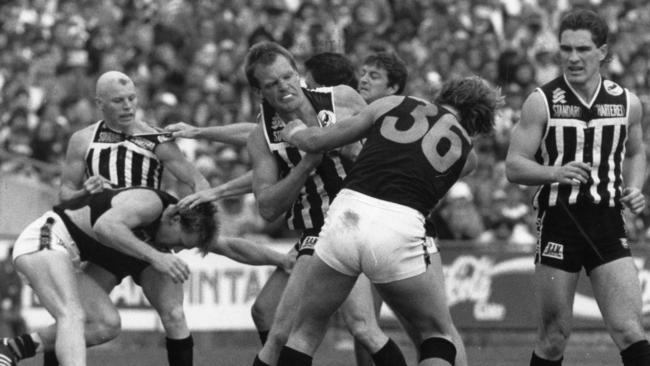It’s all black and white when it comes to the Port Adelaide-Glenelg rivalry
They didn’t like each other then, and they don’t now. As Port and Glenelg prepare for another chapter in their famous rivalry, former stars reveal how their clashes get so heated.
Glenelg
Don't miss out on the headlines from Glenelg. Followed categories will be added to My News.
- The clash that put Glenelg and Port on an SANFL war path
- Latest Advertiser subscriber deals, prizes and giveaways
They have lived and breathed the Glenelg-Port Adelaide rivalry.
Four men who have a combined 13 Tigers-Magpies grand finals between them from 1977 to 1992.
Port pair Tim Ginever and George Fiacchi — both seven-times premiership players — have bragging rights, boasting a 100 per cent strike, winning grand finals against Glenelg in 1988, 1990 and 1992.
Bays legend Graham Cornes lost all four grand finals — as a player and coach — that he contested against the ‘Pies — in 1977, ‘81, ‘88 and ‘90.
Stream every match of the 2019 Toyota AFL Finals Series before the Grand Final live and on-demand on KAYO SPORTS. Get your 14-day free trial and start streaming instantly >
Former Glenelg captain and current president Nick Chigwidden played in the club’s losing grand finals in 1988, ‘90 and ‘92.
With the Tigers meeting Port at Adelaide Oval on Sunday in a SANFL grand final for the seventh time — their only victory came first-up in 1934 — the four men who epitomise what the rivalry means got together to discuss the history between the two clubs.
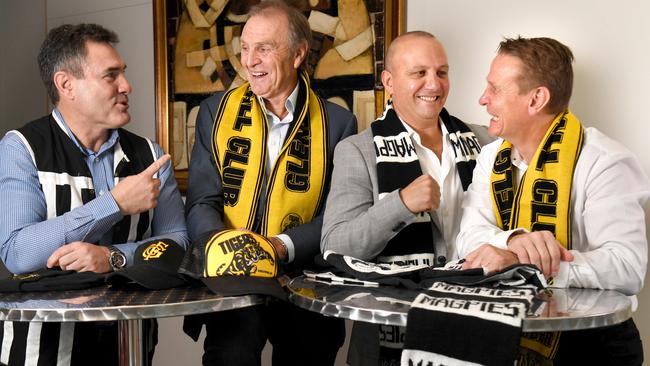
What makes the Glenelg-Port Adelaide rivalry so strong?
GC: Because they’ve both been strong, proud clubs over the journey who have had good battles. I guess we’ve always had a bit of an inferiority complex because Port Adelaide has been such a dominant team for a century and a half but ......
GF: C’mon Graham, it’s five to one in grand finals between the clubs, that is a domination.
GC: That’s not because of playing personnel because while Port has had some really dominant players, so has Glenelg. I think the difference has been the coaching because John Cahill’s coaching record in that time (1977-92) was sensational. I think he was the difference.
TG: You coached Glenelg in some of those grand finals.
GC: And I analysed that and thought what did he do differently to me. The magic of John Cahill was that he made his players feel absolutely invincible. He told Timmy Ginever that he was the best rover in the country but he never was.
TG: I still believe it.
GC: He told George Fiacchi (1990 Jack Oatey Medallist) that he was the best back pocket in the history of the game but he clearly isn’t. But they think they are, so it’s a con job.
TG: That’s spot on. Jack just had a magic about him that infiltrated into us. Graham’s right in that there wasn’t a day when we walked over the white line and didn’t think we were going to win or that we weren’t better than our opponent. That’s the way he made you feel. But the rivalry also was about the ‘haves’ and the ‘have-nots’. The Bays, in our time, were Hollywood. They had the Bay Disco for God's sake. We had Bucky’s Disco.
GF: Theirs was for beautiful people, we had UFC.
GC: The only time I went to the Bay Disco was to drag (former Glenelg captain) Chris McDermott out.
TG: They had everything, it’s an affluent area compared to the Port. So there’s maybe a little bit of that as well. At Port Adelaide, you always look for that underdog type of mentality and it was quite easy to do that against the Bays.
NC: Both clubs have big supporter bases who are very passionate about their club. The rivalry’s certainly there, especially during the 1980s and 90s when the two teams had so many of the best players in the competition. They loved competing against each other, so these games were alway massive and that spilt over into the supporters and the passion that went with it.
GF: I think you've hit it on the head with the superstars. When I first started, Glenelg had (Stephen) Kernahan and McDermott and in one of my first games against the Bays (in 1985) we lost by 20 goals and big Bob (McLean), our chairman, came out with big headlines in the paper saying it was ‘the worst (Port) team since the war’. I thought, ‘how well have I gone’. Then I started calculating how many years that was and I thought, ‘gee, I hope he’s not talking about World War I’. Luckily things improved from there. But to me the rivalry was about the players because Glenelg had so many good ones, they were good opponents. But we hated their guts, let’s not muck around.
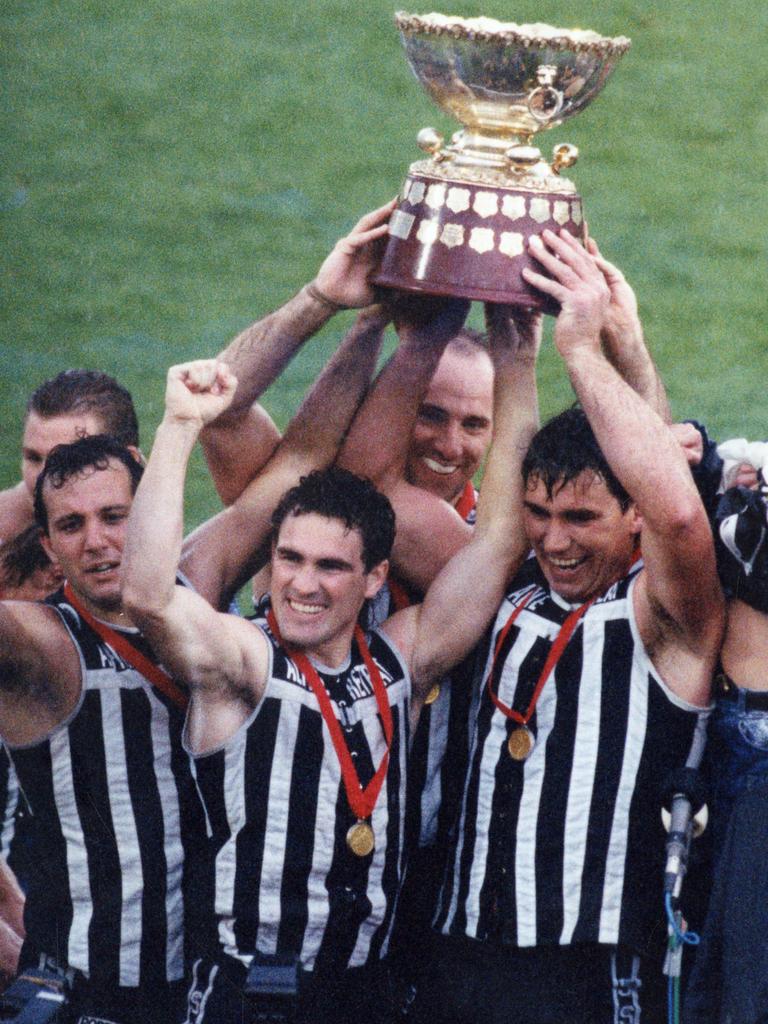
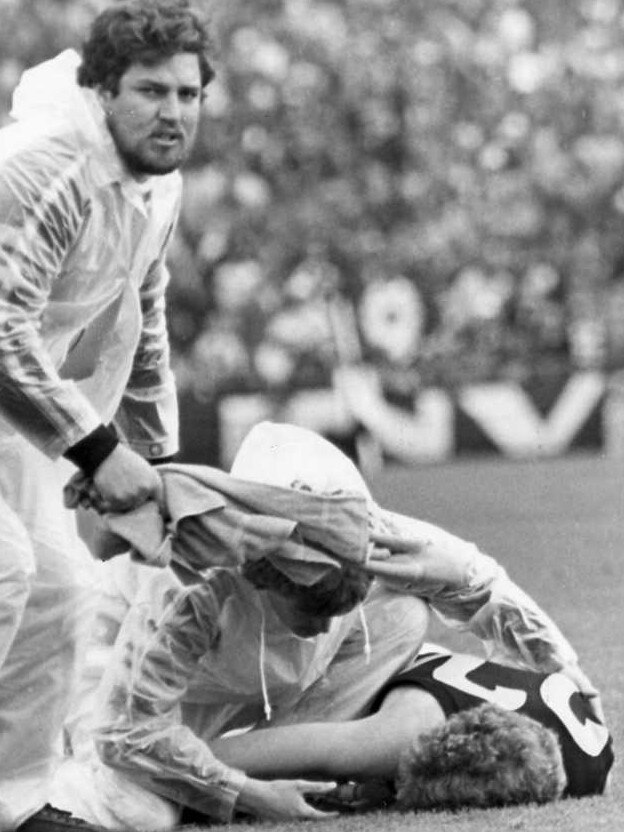
There’s been plenty of fiery individual clashes in finals between the two teams, including David Granger’s run-in with Neville Caldwell in the 1981 grand final and with ‘Cornesy’ in the 1982 preliminary final, Scott Salisbury collision with Greg Anderson in the 1986 qualifying final and Fred Phillis taking on Tim Evans in the 1977 decider. Is there genuine bad blood between the clubs?
GF: Yes, there is. There is no sugar-coating it. We hated them, didn’t like them at all — and still don’t. But we enjoyed playing against them because you knew you were in for a contest, a fierce contest. The grand final results are five to one but we’ve lost quite a few other finals and minor round games against them. A lot of the time Glenelg was the best team and we were lucky enough on grand final day to have won, probably because of Graham’s coaching.
TG: Some of that got created in the late 1970s and from there, some of the hits, were massive. (David) Holst on Tony Giles at the Bay in 1983, wow.
GC: That was more in play, wasn’t it?
TG: Yes, but you heard the bones rattle. I'd played reserves that day and was watching from the boundary line and when he hit him, wow, it took his legs, everything out from under him, and bang, an absolutely cracking hit. But I think it was play on, there was no report, just an incredible hit. George, in 1992 you coat-hangered Johnny Fidge, did you have a death wish?
GF: I’ve been running ever since. But a lot of it (the rivalry) wasn’t physical, it was verbal. It was a bit of fun out there, we used to really get into each other.
TG: You might not have got too physical but I remember the 1990 second semi when the Bays beat us by a small margin and there was a ball at centre half-forward and I thought, ‘oh, you beauty, this is mine’. Then the tweety birds went around in my head. Allan Bartlett came off centre half-back, just beautiful, right up the middle. I went down and had those little moments where you think ‘where are you, what are you doing?’ Then finally I got back to my feet. A couple of weeks later I see ‘Barts’ at Lenny’s (Tavern), know him well, we had a beer and I said, ‘gee, you got me with an absolute cracker’ in the second semi and he’s like, ‘well, not good enough apparently. Cornesy said to me, why did he get up?’ I loved it.
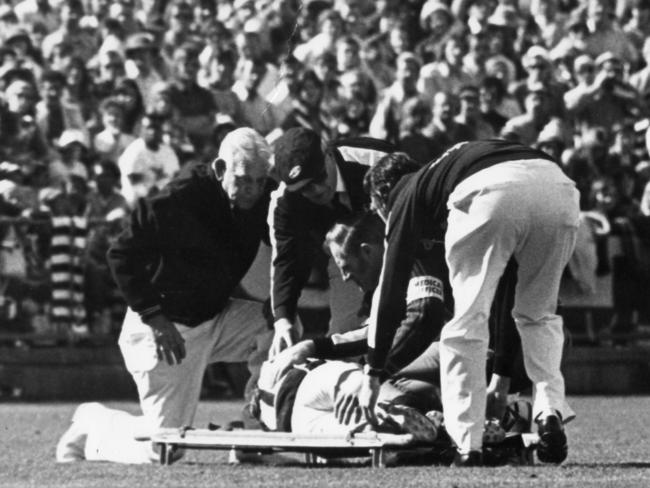
YOU were involved in an incident yourself, Graham, when Kym Kinnear was stretchered off in the 1977 grand final, sparking an all-in brawl.
GC: That was a complete accident. I was chasing him, the ball bounced back, he stopped and I ran into him. My knee must have hit his head.
GF: Of course it was an accident. When Glenelg do something it was an accident and when Port do something it was deliberate.
GC: No, I can swear it was an accident. What I can remember from that game is Jack Spry trying to strangle me.
HOW about the standout moments that have defined some of the Port-Glenelg grand finals?
GC: They are there. Ivan Eckermann coming back off the bench after being injured and kicking three goals in 1977 and a young Adrian Settre coming from the bench to kick three first half goals in 1990.
NC: Don’t forget Brett Chalmers’ long bomb from the middle of Football Park in 1992.
TG: I remember ‘Gibbsy' (Ross Gibbs) turning to me after Scotty Hodges went off with a bad knee injury in the second quarter in 1990 and saying, ‘well, that makes it a bit easier’. I said, ‘it’s not over yet, mate’. Then up bobs Settre. We were hanging on for dear life in the last quarter that year. We were tired, we'd gone through the hard way through the prelim and had a lot of injuries.
GC: We threw everything at you in the last quarter. I’ll always remember Tony Symonds, in terms of inspirational leading, standing up, but we just couldn’t crack you.
TG: I’ll tell you something that used to happen with Jack (Cahill). He hardly ever used taggers but on grand final day he would come up with one or two tags. In the second semi-final in 1990, when we lost, David Marshall was outstanding and ‘Bone’’ (McDermott) had a mountain of ball, so Jack put Mark Williams on McDermott and Bruce Abernethy took Marshall. They weren’t hard tags and the player was still told to win the ball himself, but the opposition player would be minded. Jack only ever did that in grand finals. When we lost that second semi, Jack was asked why he didn’t do something about Marshall and ‘Bone’ and he said, ‘don’t worry, you’ve got to keep stuff up your sleeve’. He didn't want to play his cards early.
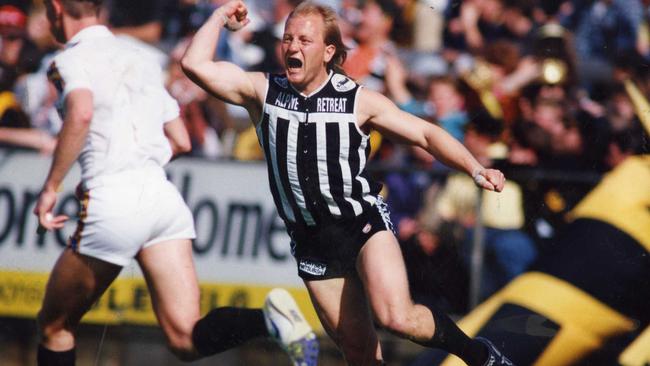
IF you could pick a former teammate to play for your club on Sunday, who would it be?
GF: Greg Phillips. He was amazing with the way he used to attract the ball. The opposition just used to kick it to him. He never got beaten in big games. When you are a back pocket, running wide, he was a godsend.
TG: For the big moments, it was Hodges. He was outstanding on the big days.
NC: Having Stephen Kernahan sit at centre half-forward would be pretty handy for us. And if you wanted a tough nut in the middle, you couldn’t go past McDermott.
GC: At the height of my era, Peter Carey. He kicked six goals from centre half-forward in the 1973 grand final (win against North Adelaide) and he was just so versatile and influential. In the latter era, it would have been Kernahan.
THE opposition player you most feared?
GF: You'd wake up the next day after playing against Scotty Salisbury and say ‘gee, he got me again’. He was always tough. But Marshall was so skilful and classy and would run rings around you if you let him. And we knew we wouldn’t win the taps against ‘Super’ Carey.
TG: Skill-wise, Marshall was a real worry for us. If he had any shots within range, he would kick the goal, it didn't matter what angle. He could get a lot of the ball and he never wasted it, so I admired his skill level enormously. But as far as a matchwinner goes, ‘Fidgey’ (John Fidge) was a guy who could kick six-to-eight goals. He was so strong and powerful and was a very good kick. I always feared that if they could get the ball in enough, he could be very dangerous. And ‘Bone’ was an incredible player because he could just keep getting the ball.
NC: Hodges on his day was an absolute matchwinner and just so hard to stop when he was going. When you look at the Port team through my era, they were a very even team and hard to match up on but Hodges on his day was the difference maker.
GC: From the guys I played against it was Russell Ebert and Max James. But the one who was the most influential in finals was Granger. You don’t like to say it because he didn’t play within the rules of the game. But he was a good player. Everyone talks about the 1982 preliminary final but go back to the 1981 grand final and I think you'll find he was very influential in that game.
TG: He had beautiful hands and was a very unselfish player.
GC: As a coach, Hodges was the one who you were concerned about and Russell Johnston was a very good player.
GLENELG’S last flag was in 1986, Port’s was in 1999. What would it mean for your club to break a long premiership drought this weekend?
GC: From where Glenelg has come a few years ago, being almost bankrupt, it would be an enormous boost. Chiggy has come along and helped revitalise it and done a fantastic job. It would be an endorsement of all the hard work that the administration has done over the years. But from a suburban point of view, it would give the whole district a real lift because while the AFL has dominated, there is an enormous amount of support out there for the Glenelg Football Club.
NC: It would be massive. Thirty-three years for a supporter to still be barracking for a club when you haven’t won a flag is an unbelievable effort. We haven't played in a granny for 11 years. After we beat Adelaide last Sunday (in the preliminary final), I was just so happy initially — we’ve got to go on and win the grand final now — but if we’d gone out in straight sets it would have been so disappointing for our supporters and playing group not to have even got the big dance to be able to have a dip at it. Now it’s really important we win it because we’ve talked about the (grand final) record between the two clubs and there has to be a time where you draw a line in the sand and say ‘we win this game of football’. It’s going to be a massive challenge but if Glenelg can beat Port — a very good opponent with a great history — and break a 33-year drought, I couldn’t think of anything better.
GF: It’s a record drought for our footy club. It’s been a tough few years because we hit rock bottom in that 2010-12 period and the Magpies in the SANFL almost died, so there’s a lot on the line for both clubs. Port needs something positive to walk into next year with, being our 150th year, and to have a premiership, to add to our collection, would be fantastic. But it's going to be hard work because Glenelg is a good side. This team doesn’t play like traditional Glenelg teams, it is really hard at it and doesn’t let you get an easy kick. Even I might have struggled to get a kick out there.
TG: It’s been a long time between drinks for both clubs and ‘Chiggy’, I know you’re president and will have something to do with the running of the club’s post-game celebrations if you win, but just be careful. Because in 1985 when you broke a 12-year drought, two of our (Port) teammates, Wayne Mahney and Rohan Smith, went down to the Bay for the post-game celebrations. Wayne was dressed like you, white shirt with black pants on, they were 18, 19, with bugger all money, and Rohan said, ‘we’re not going to be able to afford a beer’. Mahnes said leave it to me and went down to one of the tents on the oval and said, ‘how are you going, do you need a hand?’ They said, ‘yeah, we’re short, can you go up to the office and grab some beer cartons?’. He comes back with a trolley full of beer, starts serving behind the bar, then he said, ‘I’ve got to go back up’. They said take the trolley with you. He took four cartons on the trolley and then proceeded to go on the oval and drink them.


